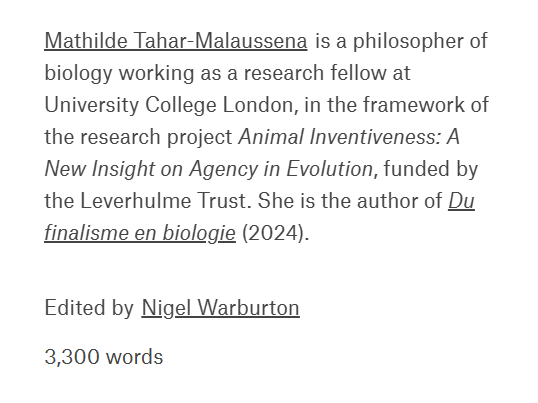Welcome to DU!
The truly grassroots left-of-center political community where regular people, not algorithms, drive the discussions and set the standards.
Join the community:
Create a free account
Support DU (and get rid of ads!):
Become a Star Member
Latest Breaking News
Editorials & Other Articles
General Discussion
The DU Lounge
All Forums
Issue Forums
Culture Forums
Alliance Forums
Region Forums
Support Forums
Help & Search
How evolution favoured frivolous animal play

Why the cat wags her tail
Here’s a puzzle: how could evolution favour such a costly, frivolous and fun activity as animal play?
https://aeon.co/essays/how-evolution-favoured-costly-and-frivolous-animal-play

Raina the Rhodesian ridgeback and Ruuxa the cheetah at the San Diego Zoo Safari Park in California, 2015. Photo by Sandy Huffaker/The New York Times/Headpress

In Cheshire, a fox is poised to pounce on its mate when a badger bursts from a bush. The badger starts chasing the fox, which keeps leaping away, finally distancing itself. Then the fox suddenly turns back, approaches cautiously, and jumps sideways, facing the badger head-on. Back arched, head low, it stops, remains still. After a pause, the badger swiftly resumes the chase, causing the fox to hop around before lunging at its companion and darting off together.
In Orlando, three dolphins are swimming in unison when one forms a perfect bubble ring. Another immediately approaches and blows another ring, which merges with the first to create a larger hoop. The third dolphin appears to attempt to pass through it, completing their improvised choreography.
Animals often engage in play, from the spectacular to the subtle. Hyenas stage mock brawls, cats spin in circles chasing their tails, octopuses play push-and-pull with bottles, dogs bury sticks only to dig them up moments later… Even polar bears have been spotted playing with dogs, grabbing them in what looks like a hug, rolling in the snow, and letting the dogs gently nibble their lips. Such scenes make us grin with delight. But is that all there is to it?
Animal play can seem trivial, even laughable. Often defined as an intrinsically rewarding activity, yet offering no immediate survival benefits, its very existence is puzzling. While it has long been hypothesised that play serves as a rehearsal for adult behaviours, some studies suggest that it might not be crucial to their development. Similarly, although some scholars propose that play allows animals to expend surplus resources (time, energy, neural activity) – which could explain play’s prominence in pets – this does not account for its widespread occurrence in wild species. Play challenges us with its apparent lack of biological necessity.

Albertine and Pippo
As I was writing these paragraphs, my cat Albertine approached my dog Pippo and slowly rose onto her hind legs, wagging her tail while presenting her forepaws. After freezing for a few seconds, she started tapping his lips frantically. Right after, spotting a speck of dust flying around, she hopped up on the table, scattering my pens with a thunderous clatter, then immediately jumped onto my shoulder, clinging as if to a tree, before leaping off to burrow under the sofa, grunting. Watching her, I can’t help but suspect – much as Michel de Montaigne did with his own cat – that she may be playing with me (and us) far more than I am playing with her. And there’s something surprising, even unsettling, about this idea. Because, through their play, animals reveal an inner self we cannot access, one we are quick to dismiss as empty or purely sensory – infinitely more limited than our own. Whether phylogenetically close to us or vastly distant (especially when distant), we imagine animals as prisoners of their instincts, focused solely on survival. Yet play offers more to the spectator than its delightful exuberance: it reveals a freedom and creativity unique to animals, which intrigued Montaigne and challenges us to reconsider our assumptions.

snip
7 replies
 = new reply since forum marked as read
Highlight:
NoneDon't highlight anything
5 newestHighlight 5 most recent replies
= new reply since forum marked as read
Highlight:
NoneDon't highlight anything
5 newestHighlight 5 most recent replies
How evolution favoured frivolous animal play (Original Post)
Celerity
Saturday
OP
Adorable and needed. More play, less war. We will all be healthier, wealthier, and happier. What's not to like?
Bernardo de La Paz
Saturday
#2
Play is how nerds excel & succeed. They play around with things & concepts a lot. I recommend deliberate play. . nt
Bernardo de La Paz
Saturday
#3
Play with other people & animals requires thoughtfulness & empathy. It teaches cooperation
Bernardo de La Paz
Saturday
#5
If it is a game, the play's the thing. They will cheat, call them on it, ref the games, etc. It's not about winning
Bernardo de La Paz
Saturday
#7
SheltieLover
(65,626 posts)1. Kick
Ty for sharing!
![]()
Bernardo de La Paz
(53,703 posts)2. Adorable and needed. More play, less war. We will all be healthier, wealthier, and happier. What's not to like?
Bernardo de La Paz
(53,703 posts)3. Play is how nerds excel & succeed. They play around with things & concepts a lot. I recommend deliberate play. . nt
Bernardo de La Paz
(53,703 posts)5. Play with other people & animals requires thoughtfulness & empathy. It teaches cooperation
Red and Blue should play together more. In whatever forms can be arranged.
For the sake of the United part of the States.
SunSeeker
(55,297 posts)6. Red players cheat.
Bernardo de La Paz
(53,703 posts)7. If it is a game, the play's the thing. They will cheat, call them on it, ref the games, etc. It's not about winning
It's not about winning in the end when playing games. It's about the playing.